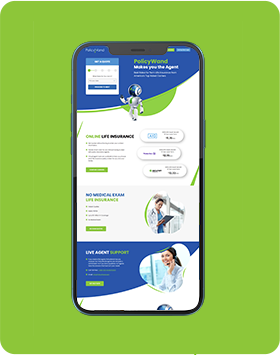When you applied for your life insurance policy online, what you received was a quote. To obtain the actual policy, life insurance companies require a phone interview. And depending on how much life insurance you’re seeking, that may be all that’s required.
If you have spoken with one of PolicyWand’s noncommissioned agents, you know that they’re only there to answer questions pressure-free. Conversely, the person conducting your post-application interview is simply there to ask questions. Sometimes it’s the agent asking the questions. Other times it’s a third-party company representative.
Whoever is asking the questions, the main purpose of the life insurance phone interview is to verify that the information you provided on your application is true. It also ensures you buy only what you need and avoid buying what you don’t. The insurance company seeks to give you the best coverage and the fairest price.
What You Can Expect During a Life Insurance Interview
The interview takes no more than 30 minutes and at the end, you and the carrier will schedule a paramedical exam if one is required.
As long as you answer the questions accurately, the interview is easy. You’ll answer questions about your health, your job, your hobbies, and your finances.
Tips to Prepare for Your Life Insurance Phone Interview
Gather your documents ahead of time. Review the categorized lists below and make sure you either have the items on hand to refer to or can accurately answer questions about them.
Also, answer the questions as simply as possible. This keeps things running smoothly and saves you from answering more questions than you want to.
LEGAL DOCUMENTS
The insurance company will ask to verify your identity. So have the following items handy:
- your driver’s license
- your social security number
- your citizenship documentation, if applicable
WHY? The carrier needs to make sure it’s you and not someone else buying the policy. If the person buying the insurance is not the person to be insured, the carrier will interview both people to establish what’s called insurable interest.
LIFE INSURANCE HISTORY
If you’ve applied for life insurance before, have that paperwork ready. Or at least be able to answer questions about previous applications.
Why? The insurance carrier is required to verify that the information that you provided on this application matches information from previous ones. If there are discrepancies, the carrier wants to clarify them so you don’t get turned down for misrepresentations during the underwriting process.
MEDICAL HISTORY
Be prepared to provide information about:
- any diagnoses you’ve had in the past 10 years
- any surgeries you’ve had in the past 10 years
- your prescriptions
- your current physicians and their names, addresses, and phone numbers
- family health history, including:
- diagnoses of major illnesses such as cancer, diabetes, or heart disease
- the dates and causes of immediate family members’ death, if applicable
- relatives you’ll be asked about include parents, siblings, and grandparents
- your current weight and any weight fluctuations you’ve experienced, plus or minus 10 pounds, in the past year
Why? They need to assess your health status to assess your risk. The healthier you are, the less you will pay in premiums. The less healthy you are, the higher your premium. Your conversation is protected under HIPAA laws.
HABITS
Smoking, drinking and drug use will raise your rate. Exercise and good habits lower it. Be prepared to answer questions about:
- how often you exercise, including team sports
- If you’ve quit drinking, smoking or using recreational drugs, make sure you share how many years it’s been since you quit. That may lower your premium rate.
HOBBIES
Not only do habits affect your insurance rate but hobbies can, too. Be ready to answer questions about any extreme sports you engage in such as car racing, rock climbing and the like.
Why? Your habits and hobbies also affect your risk. The riskier they are, the more you’ll pay in premiums.
FINANCES
Finances also factor into the risk assessment equation. Be prepared to answer questions about:
- the job you currently have
- the salary you currently earn
- your assets
- an estimate of your net worth
- how much debt you have
Why? The insurance company needs assurance that you can afford to pay the premiums for the foreseeable future. A steady job and strong assets make you a better candidate.
Although some carriers forgo the paramedical exam for policies with lower death benefit payouts, there’s no getting around the phone interview. It’s not only in the company’s best interest but yours as well. Preventing fraud allows insurance companies to provide you and their other clients with the best coverage at the fairest price.
That’s in everyone’s interest.







